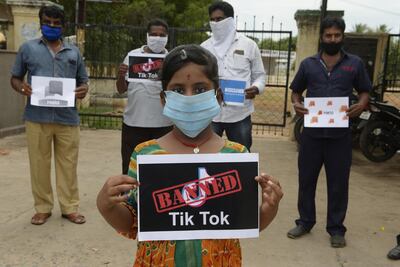Smartphone apps collect data about us. Most people are aware of this, but generally choose to ignore it. Concerns surrounding the video app TikTok, however, are growing.
That’s partly down to its booming popularity, and partly due to fears that data held by technology firms can be accessed and misused.
This is the driving force behind a current US Senate bill that would ban state employees from using TikTok on their work phones, but India has gone much further. All citizens are now banned from using it, along with 58 other Chinese-made apps. According to a government statement, they are “prejudicial to [the] sovereignty and integrity of India, defence of India, security of state and public order".
It's far from a coincidence that China and India have been engaged in a stand-off in the border region of Ladakh, just north of the Himalayas. Clashes last month prompted a wave of anti-Chinese sentiment in the country. This raises the question of whether the TikTok ban is really about privacy or the moving of a pawn in a wider geopolitical game.
Just hours after the announcement, TikTok's apps could no longer be found in either Apple's or Google's Indian app stores, and ISPs were ordered to block access to all 59 apps on the list, including the popular strategy game Clash Of Kings.
Many Indians welcomed the move. Muskan Sharma, a TikTok user with 4.6 million followers, posted a video on Twitter in which she offered her full support. “We are all very happy with this decision,” she said.
Indian engineer and public figure Sonam Wangchuk, meanwhile, called for a wider boycott of Chinese products, while an app designed to delete all Chinese apps from your phone was downloaded by five million Indians in a few days. Rival apps to TikTok, such as the Indian-made Chingari, have seen a surge in usage.
However, the sheer popularity of the app prompted a wave of anger at the government’s overreach. Users took to social media to complain, using hashtags such as #TikTokBan and #ByeTikTok.
“This single act of web censorship has impacted more people in India than ever before,” says Apar Gupta of the Internet Freedom Foundation, a campaigning group based in New Delhi.
While 120 million Indian users of TikTok no longer have access to the platform, millions more who use other apps, such as WeChat, are also affected. “Roughly one in three smartphone users will be impacted in India,” said analyst Tarun Pathak in a tweet on Monday.
Many of those people will have wondered why TikTok should be banned for its data policies, if other apps such as Facebook and Twitter, which have been widely criticised for similar failings, can continue to operate. Is TikTok really any worse?
Some in the tech industry would contend that it is. In February, chief executive of Reddit, Steve Huffman, described the app as "fundamentally parasitic". A small number of researchers have echoed his concerns.

The issue is broader than data gathering; it’s also about what happens to it, particularly in light of the law passed in China in 2017 which requires technology firms to “collaborate in national intelligence work". TikTok denies passing information to the state, and released a Transparency Report at the end of last year stating that the Chinese government had requested no information from them.
The handling of our personal information by technology companies has prompted many concerns over the years. But the notion of that information being accessible by foreign governments has caused both the US Navy and Army to ban the app.
While the Indian government’s actions are probably prompted by the recent armed skirmishes, it’s consistent with wider concerns over the power and reach of technology companies.
India is the first country to enact such a ban, will it be the last?

